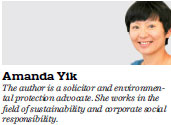Time to act on climate change as China takes leading role
Updated: 2017-04-18 06:58
By Amanda Yik(HK Edition)
|
|||||||||
As US President Donald Trump issues his executive order to reverse the climate plans put in place by his predecessor Barack Obama, the world looks to China to take on the global climate leadership mantle. The Chinese mainland was responsible for roughly 29 percent of the world's carbon dioxide emissions in 2014 (although its per-capita emissions are half those of the US). Indeed, massive investments in renewable energy are putting the mainland on course to generate 20 percent of its electricity from renewable sources by 2030.
And where does Hong Kong stand amidst this seismic shift?
After a warm Lunar New Year we experienced one of the coldest springs in recent memory. Unless you are cold-blooded, it's not difficult to notice the effects of climate change in Hong Kong.
The Hong Kong government took bold steps last year to move ahead, including setting up the Steering Committee on Climate Change, a stakeholder engagement forum in the summer, leading up to the publication of the 100-page Climate Action Plan 2030+ in January this year.

The action plan confirms a target in line with the one set by the central government: a 65-70 percent reduction in carbon intensity by 2030, based on 2005 levels. While this is significantly higher than many other Asian economies, including Hong Kong's long-standing rival Singapore, whose reduction target is 36 percent, there is concern that such targets are not yet consistent with limiting warming of global average temperatures to below 2C.
For Hong Kong, the key to reducing carbon intensity lies in the electricity fuel mix. The single biggest reduction will come from phasing out coal-fired power and heavier reliance on natural gas. Despite geographical limitations, Hong Kong possesses renewable energy potential which the action plan estimates to be 3-4 percent, whereas hopeful non-government organizations have urged the government to aim for a more aggressive target of at least 5 percent. To achieve this will necessitate a feed-in tariff and other measures that the government must explore with the power companies. These can be introduced in the next Scheme of Control period.
That said, there are three things regarding the fuel mix that we should bear in mind. Firstly, natural gas is not clean energy. It's cleaner than coal but it's made up mostly of methane, itself a potent greenhouse gas. Secondly, this reduction can be made real only on the premise that 25 percent of our electricity will continue to come from nuclear plants across the border. Thirdly, by 2020 coal will still account for 25 percent of our electricity. The action plan does not mention whether, or when, Hong Kong will become coal free.
Despite controversies around natural gas and nuclear energy, the reality is that they are expedient alternatives to coal that keep the city going, at least in the short to medium term.
In the meantime, how well are we doing in conserving energy? Our energy consumption has consistently increased 1 percent every year between 2004 and 2014. As Hong Kong's population continues to rise, the urgent imperative is that Hong Kong needs to become much more committed to energy saving and energy efficiency than it currently is.
The government's efforts in adopting energy efficiency measures in government and public buildings is commendable but the 2015 Energy Saving Plan admitted that mobilizing commercial building operators to achieve better energy efficiency is a gap that needs to be filled. Advocates have asked for an energy efficiency improvement target to incentivize the right kind of investments but disappointingly the action plan fell short in this regard.
What has been put in place up till now is a voluntary 4T (Target, Timeline, Transparency, Together) framework to encourage reduction in energy consumption in the private sector on the basis of partnership and best-practice sharing. The government's aspiration is that energy saving, assessing energy performance and retrofitting existing buildings will become mainstream in the next decade. However, in the absence of clear targets or metrics for measuring progress, anything that can be done to speed up this process will be welcome.
As Hong Kong citizens, there are a whole host of steps we can all take to reduce our carbon footprint. The "switch off the lights" rhetoric is valid yet stale, and we are capable of so much more than that.
Conscious consumption is a worldwide trend that makes economic and environmental sense. Take private cars as an example. Despite having arguably the best public transport system in the world, the government projected a 30 percent increase in the number of private cars between 2007 and this year. We may take solace from the fact that a fraction of those are electric cars, for which we are just starting to provide the necessary infrastructure, but the question remains - do so many of us really need to own cars in Hong Kong?
The simple truth is that we can all reflect on how our purchases and actions affect climate change. A good starting point is to calculate our own carbon footprint by using online calculators.
Ultimately, climate change is everyone's responsibility.
(HK Edition 04/18/2017 page9)